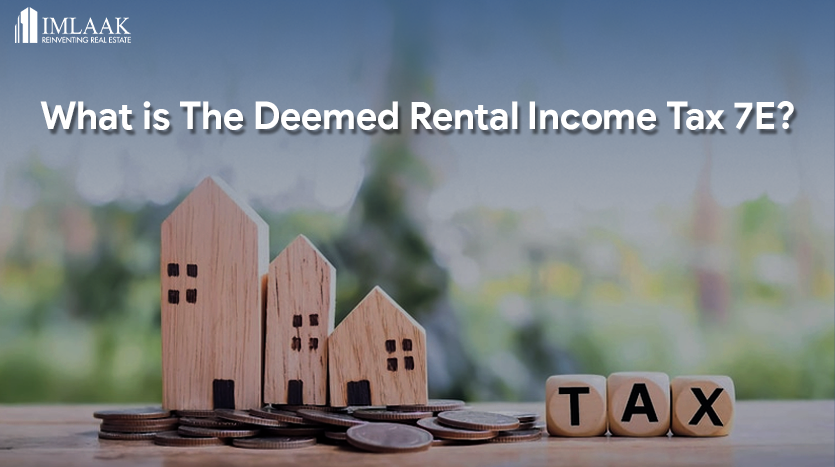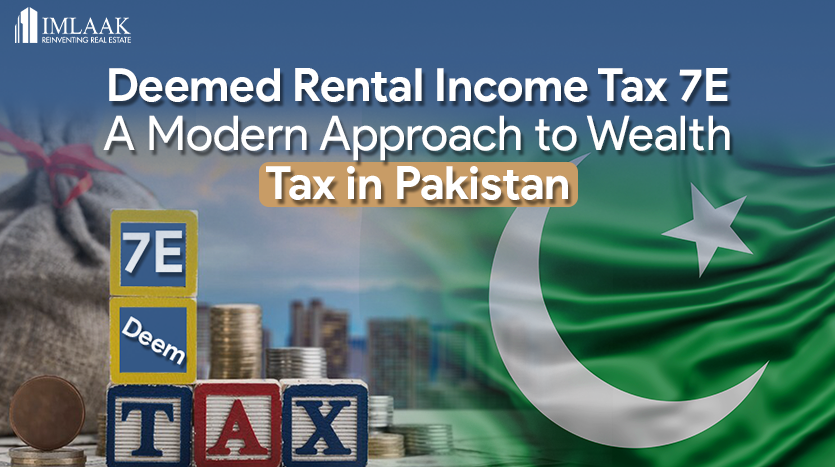Deemed Rental Income Tax 7E: A Modern Approach to Wealth Tax in Pakistan
The tax environment in Pakistan has changed significantly during the last few years. The Rental Deem Tax, which is essentially a wealth tax rebranded with a focus on unproductive properties, is one such introduction. Let’s examine this tax in detail and how it affects the real estate industry.
What is The Deemed Rental Income Tax (7E)?
The ‘deemed rental income tax’ is the new age’s response to the conventional wealth tax. Where the focus is on non-productive assets, such as unused houses or buildings and unconstructed plots. The rate of taxation is set at 1% of the FBR-determined value of underutilized properties with a value of more than 25 million PKR. This applies to non-productive properties like plots, buildings, and houses that don’t produce income and are therefore subject to the Rental deed Tax.
On unused/additional property worth at more than Rs. 25 million, the Federal Board of Revenue (FBR) has specifically prescribed a 1% Deem Tax. In essence, the government has determined a notional income for such properties of 5% of their FBR value annually. A tax of 1% of its FBR value will be applied to the remaining 80%, or 20%, of this amount.
Although your primary house and a total of up to 25M PKR worth of property are excluded from this tax, other categories are impacted. The major goal here is to make sure that high-net-worth individuals who accumulate property, especially idle property, pay their fair share of taxes.
The Important Takeaways of the Deemed Rental Income Tax
1. Property values added together: If you own numerous properties, their combined FBR value is taken into account. For instance, if you own 10 plots worth a 100 M in FBR value, the first 25 million is exempt and the remaining 75 M is taxable.
2. Built-up Properties: That Aren’t Rented Out: Even if you possess developed properties that aren’t rented out, they are nevertheless subject to this tax.
3. A Check on the Wealthy: This tax primarily targets affluent people who own a lot of properties but don’t rent them out or avoid declaring these properties as rental income.
4. Rental Properties: No additional tax is imposed if a property is rented and the tax imposed under section 15 of the Income Tax Ordinance is more than the tax imposed under this section. However, if it is less, the difference is due in accordance with this provision.
5. Exemption for builders: Builders and developers who have purchased land for the sake of development or construction and are registered with DNFBP.
Important Exemptions:
- Exemption on the house which is used for personal living.
- A person’s personally owned place of business where they do their business at any time of the year;
- Farmhouses and the land they are annexed to are not considered to be self-owned agricultural land for agricultural operations.
- capital assets allocated to specific people, including federal and provincial governments, war-injured soldiers serving in the Pakistani military, Shaheeds or families of Shaheeds.
- Income from any property subject to tax under the Ordinance and proof of payment of tax.
- When the FMV of the property or properties, together, excluding the capital assets stated above, does not exceed Rs. 25 million.
- Acquisition of a capital asset on which advance tax u/s 236K has been paid during the tax year.
- Property owned by the provincial and municipal governments, or Property owned for land development and construction by a development and local authority, builders, and developers who are registered with the Directorate General of Designated Non-Financial Businesses and Professions Board (DNFBP).
Example of Deemed Rental Income Tax
Let’s assume Mr Amjad owns the following properties:
- 1 x house worth 50 M PKR in FBR value where he resides himself.
- 2 x commercial buildings, shop, and warehouse where he runs his business worth 100 M PKR in FBR value.
- 10 x plots of various sizes worth 100 M of FBR value combined.
- 2 x houses of worth 150 M PKR FBR Value which are rented but he doesn’t declare the rental income.
- 2 x Plazas in DHA worth 200 M PKR in FBR value were rented out but not declared as rental properties and therefore no rental income tax is paid on these buildings.
Rental Calculation:
- House under his personal use is exempt, so he doesn’t have to pay any tax under the rental deemed tax head.
- His commercial building or shops which are registered for running his business, are also exempt from this tax.
- 25 M out of 100 M worth of his plots is exempt from this tax and therefore he will have to pay 7.5 lacs on the remaining 75 M worth of his plots.
- He will have to pay 15 lacs on the houses per year as rental deem tax, if he has not declared them as rental properties and not paying rental income tax on them.
- He will have to pay 20 lacs on the plazas as rental deem tax if he has not declared them as rental properties and not paying tax on his rental income.
So his total tax amounts to 42.5 Lacs per year
Seems steep, but not really considering that Mr. Amjad should raise approximately 3 crores every year in rental income from his 3 houses and 2 commercial buildings.
Impact on the Real Estate Sector
A number of trends and changes in the real estate sector can be predicted as a result of the implementation of this tax:
1. Price Correction for Plots and Unused Properties: Property owners may feel pressured to sell as the tax burden on non-productive assets rises, which would increase the market’s supply. The cost of plots and vacant properties can go down as a result.
2. Shift to Productive Cash Flow Assets: Investors may decide to change course and focus on rental and productive assets, which will guarantee a steady stream of income to balance any potential tax penalties.
3. Increased Demand in Construction: As investors look to put their assets to good use, the construction sector may see an increase in demand, which might result in future growth.
4. Renter transparency: Since this tax can be avoided by renting out properties and disclosing the revenue, it may result in fewer instances of concealed or unreported rental income.
How to Avoid Rental Deem Tax
1. Invest in rental properties: You can avoid the effects of this tax by moving investments from nonproductive plots to rental properties.
2. Asset Transfer: One tactic is to give your assets to your spouse or children. Each person has a 25 M exemption, giving a greater overall exemption.
3. Utilise Empty Spaces: You can avoid taxes and make money by turning vacant properties into warehouses or retail establishments which are used by your business.
In conclusion, despite its seeming complexity, the Rental Deem Tax is a calculated step to promote the efficient use of resources, increase transparency in the real estate industry, and guarantee the fair distribution of the tax burden. Whether you’re a real estate tycoon or a normal homeowner, knowing the specifics of this tax will help you make wise choices. Always think about speaking with a tax expert to comprehend the nuances specific to your circumstance.
Shahnawaz Yaqub Bhatti
CEO & Senior Investment Consultant
Whatsapp +92 333 1717170


